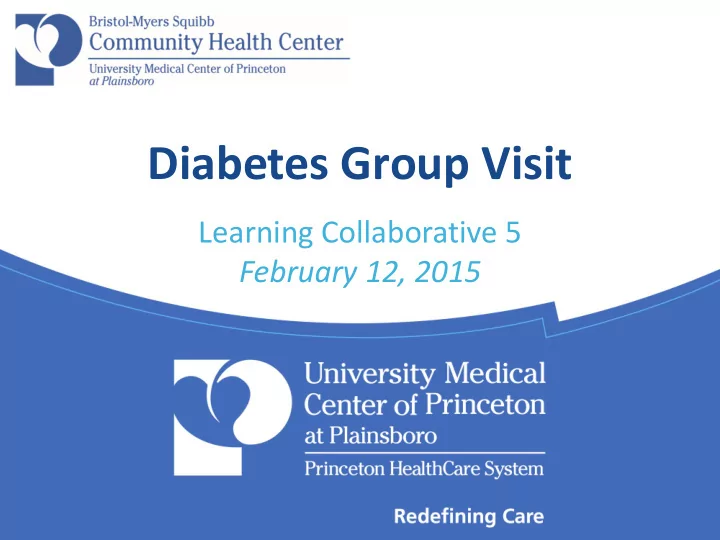

Diabetes Group Visit Learning Collaborative 5 February 12, 2015
Overview of PHCS’s Diabetes Specialty Clinic • Bristol-Myers Squibb Community Health Center • Suburban underserved population in Princeton, NJ • High risk patients from population of 400-500 diabetes patients • Diabetes group visits: 1 day a week, 6-12 patients each day – Interdisciplinary Pre-conference – Group provider visits (Endocrine, IM Residents, RN CDE) – Patient group education session/therapy – Peer support & education groups with LCSW and RD – Medication assistance through pharmacy technician • Care coordination 2
DSRIP Patient Clinical Criteria • Patients with uncontrolled diabetes • Diabetic patients with poor health literacy • Recently hospitalized or diagnosed with diabetes • All Type 1 diabetics • Highest risk Diabetic Clinic Patients Patients screened and agree to program requirements before enrollment 3
Demographic Characteristics • DSRIP Enrollee Demographics – 54% Charity Care, 29% Medicaid, 14% Medicare, 3% other – Adult patients – 62% Female – Majority Hispanic • language barriers • transportation barriers • low general or health literacy or both • financial barriers (affording medications) • psycho-social barriers 4
Program Objectives • Provide culturally sensitive, patient-centered, high- quality care to our highest risk diabetic patients, utilizing group visits and a team-based approach – Improve patients’ diabetes knowledge base – Improve caregivers’ knowledge base – Identify and address barriers to care – Perform intensive case management • Improve clinical outcomes • Reduce costs • Reduce ER/hospital visits/co-morbidities – Continuously improve our processes – Share our experiences and lessons learned 5
High Level Interventions • Risk Stratification: – Diabetes Distress Screening Scale – Diabetes Knowledge Test – Psychosocial assessment • Evidence based medicine: AACE and ADA guidelines customized to meet individual needs • Patient-Centered – Group exercise classes, culturally competent recipes – Family and caregivers welcomed to participate – Translation services – Psycho-education & Solution-focused therapy interventions – On-site testing and specialty providers • Dedicated consulting Endocrinologist • Medication assistance: – Medication samples and patient-assistance programs – Health Center Grants 6
Program Schematic 7
Evidence-Based Training • Endocrinologist-led lectures to staff & providers – “Advances in Diabetes Medications” – “Prescribing Insulin” • Interdisciplinary Pre-conference 8
Diabetes Measurables • Hgb A1c • Lipid panel yearly • Foot exams with monofilaments yearly • Dilated eye exam yearly • Blood pressure <140/90 • BMI each visit • Diabetes-related admission rates • Urine Microalbumin/Creat Ratio yearly • CMP yearly • Influenza and pneumonia vaccination • Diabetes Distress Screening Scale • Diabetes Knowledge Test • Patient satisfaction surveys 9
Customized Program Tools • Glucometers and testing supplies provided • Point-of-care testing on site • Specialty care and eye exams on site • Pharmacy technician dedicated to prescription assistance • LCSW performs Diabetes Stress Screenings • RD provides nutritional screening including 24-hour recall 10
Project Achievements to Date 11
Partnerships • UMCPP Community Education & Outreach (CE&O) – Health fairs, screenings & referrals • Inpatient service – CDE consultations and referral to program • The New Jersey Commission of the Blind – Free diabetic eye screenings twice a year on site • Specialty care – Podiatry, vascular, ophthalmology, cardiology, nephrology, surgery and other providers available on-site and in the community for charity care patients 12
Lessons Learned • Patients respond well to a multidisciplinary approach • Addressing psychosocial factors and barriers improves patient adherence to recommendations and follow up • Patient enjoy group and peer support • Access to care improves compliance (POC testing, onsite providers) • Education on and access to medications is instrumental to program success Performance Improvement (Rapid Cycle Testing) • Workflow barriers: tracking board and patient flag • No show barriers and patient expectations: pre-visit calling 13
Highlights of January Survey • High patient satisfaction scores • Stable and effective staffing • Active participation of staffing • Improving patient outcomes • Positive response to ongoing staff training • Thoughtful changes to program in response to rapid-cycle evaluations – scheduling & follow up 14
Patient’s Perspective on Success Overall, the Diabetes Clinic does aims to reach and help our vulnerable diabetes patients. • “ I am so grateful for the care that I get at the clinic. Before, when I had a job, the private doctor did not take care of me the way that the clinic does. Everybody explains everything to me and helps me to have low sugar. My mother in my home country got very sick with her diabetes, and she died. Her doctor there could not help her very much. Here, I get the care that I need, and the clinic helps me to get my medicine for free. The clinic is like my angel.” - Anonymous clinic patient 15
Recommend
More recommend